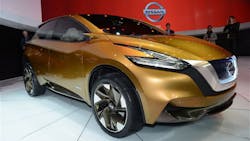TOKYO - Nissan said Friday that its annual net profit had barely moved from a year earlier despite market conditions that helped rivals Toyota (IW 1000/8) and Honda (IW 1000/30) book soaring profits.
The pair logged huge gains largely owing to a sharply weaker yen and cost-cutting that helped inflate their bottom line.
Nissan, part-owned by Renault (IW 1000/78), has also benefited from the yen's decline with its fourth-quarter earnings jumping due to the weaker currency.
But its heavy exposure to China, the world's biggest vehicle market, and recession-riddled Europe slammed the brakes on growth.
"Compared with its rivals, Nissan faces several uncertain factors, including its relations with Renault, its electric vehicle strategy and the China issue," said Tatsuya Mizuno, auto analyst with Mizuno Credit Advisory.
Japan's automakers suffered from a diplomatic row between Tokyo and Beijing that sparked huge riots across China and a damaging consumer boycott of Japanese brands.
Nissan's sales to China, which make up almost one-quarter of its total sales, far higher than its domestic rivals, fell 5.3% on-year to 1.18 million vehicles, it said.
While sales to China last month were better than a year earlier, Nissan conceded it has lost market share as Volkswagen and General Motors tried to capitalize on their Japanese rivals troubles in the country.
Recovery in Progress
"We are working hard to recover from the impact of the island dispute," Chief Executive Carlos Ghosn told a press briefing Friday.
"I consider the recovery achieved completely when our market share will come back to what it was before" the dispute flared, he added.
Demand in Europe including the key Russian market and in Japan slipped from a year earlier with strong sales in the United States and emerging markets including Thailand and Brazil picking up the slack, Nissan said.
Ghosn laid out a grim prediction for Europe this year as the continent remains mired in recession.
"I think Europe is going to be bad, but again it's like when you know that Europe is going to be bad then you can manage Europe," Ghosn said.
"There is no illusion...we are not absolutely not forecasting any growth in Europe."
However, he offered a more upbeat view on Nissan's bid to boost disappointing sales of its LEAF electric vehicle, saying governments are working on infrastructure to charge the eco-friendly cars.
Consumer fears about range and not being able to charge the vehicles out on the road have been a major impediment to commercial success, analysts say.
"We think that when consumers will feel comfortable by seeing infrastructure everywhere (those fears) will disappear and will help a lot to increase sales," Ghosn said.
More New Models Sold
Overall, Nissan said it sold a record 4.91 million units globally in the past fiscal year, up 1.4%, as it rolled out a string of new models.
It posted a net profit of 342.4 billion yen (US $3.4 billion) on sales of 9.63 trillion yen for the fiscal year ended in March.
Japan's No. 2 automaker - which posted a slightly lower 341.43 billion yen net profit a year earlier - said it expected earnings to rise almost 23% to 420 billion yen this year.
A weakening yen has helped make Japan's exporters more competitive overseas and inflated the value of their foreign income, boosting profits.
The benefit of currency fluctuations appeared likely to continue as the dollar soared past 100-yen in U.S. forex trading Thursday, a level last seen more than four years ago.
The dollar hit a record low around 75 against the Japanese currency in late 2011, setting off howls of complaints from Japanese manufacturers.
Nissan shares were up 3% to 1,063 yen in Tokyo Friday, before its latest results were published.
Copyright Agence France-Presse, 2013
About the Author
Agence France-Presse
Copyright Agence France-Presse, 2002-2025. AFP text, photos, graphics and logos shall not be reproduced, published, broadcast, rewritten for broadcast or publication or redistributed directly or indirectly in any medium. AFP shall not be held liable for any delays, inaccuracies, errors or omissions in any AFP content, or for any actions taken in consequence.
